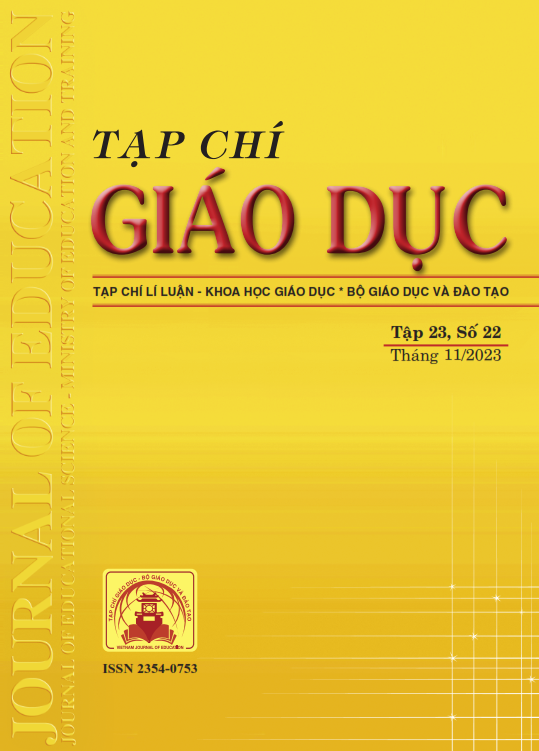Thực trạng phát triển lời nói mạch lạc cho trẻ khuyết tật trí tuệ nhẹ 4-5 tuổi thông qua trò chơi tại trung tâm chuyên biệt: nghiên cứu tại thành phố Hải Phòng
Tóm tắt
Currently, the development of coherent speech for 4-5 year old children with mild intellectual disabilities has not been adequately addressed in special education programs. Most children with mild intellectual disabilities have various difficulties in using words to express their needs, desires and views. On the basis of a theoretical system, the study conducted a survey with 37 teachers who were teaching at specialized centers in order to capture the current situation of coherent speech development for children with mild intellectual disabilities aged 4-5 years old through games. The research shows that the majority of teachers were aware of the role of developing coherent speech for 4-5 year old children with mild intellectual disabilities and used different ways to develop coherent speech for children. Specifically, organizing games was used by many teachers, ranking third after using sample speech and telling stories and reading poems. More than 80% of the teachers had negative evaluation of the ability to speak coherently of 4-5 year old children with mild intellectual disabilities. The teachers often used the same methods as those for normal children and often relied on the preschool curriculum, without their own methods. They lacked resources on how to develop children's coherent speech through games. The problem of developing coherent speech for children with mild disabilities is still very vague in both research and practice. Therefore, the research and development of measures to develop coherent speech for children with disabilities as well as instructions on how to use games to develop language for children require more attention in both theory and practice.
Tài liệu tham khảo
American Psychiatric Association (APA) (2013). Diagnostic and statistical manual of mental disorders (5th ed.). Washington, DC: American Psychiatric Association.
Bùi Thị Lâm (2011). Tổ chức trò chơi nhằm phát triển ngôn ngữ cho trẻ khiếm thính mẫu giáo 3-4 tuổi ở trường mầm non. Luận án tiến sĩ Khoa học giáo dục, Trường Đại học Sư phạm Hà Nội.
Cao Thị Hồng Nhung (2020). Một số biện pháp phát triển lời nói mạch lạc cho trẻ 5 - 6 tuổi ở trường mầm non.
Tạp chí Giáo dục, số đặc biệt tháng 4, 62-65.
Đinh Hồng Thái (2009). Giáo trình Phương pháp phát triển lời nói trẻ em. NXB Đại học Sư phạm.
Hồ Sĩ Hùng (2020). Giáo dục kĩ năng giao tiếp cho trẻ khuyết tật trí tuệ nhẹ 5 - 6 tuổi thông qua tổ chức trò chơi đóng vai ở trường mầm non. Luận án tiến sĩ Khoa học giáo dục, Trường Đại học Sư phạm Hà Nội.
Nguyễn Thị Hoa (2015). Tổ chức hoạt động phát triển vốn từ cho trẻ khuyết tật trí tuệ lứa tuổi mầm non. Tạp chí khoa học Trường Đại học Sư phạm Hà Nội, 60 (8C), 178-185.
Nguyễn Thị Hoàng Yến, Đỗ Thị Thảo (2010). Đại cương giáo dục trẻ khuyết tật trí tuệ. NXB Đại học Sư phạm.
Phạm Thị Bền (2014). Các phương pháp nhận diện và đánh giá ngôn ngữ của trẻ có khó khăn về ngôn ngữ ở tiểu học. Báo cáo tổng kết đề tài nghiên cứu khoa học cấp Bộ.
Trần Thị Minh Thành (2013). Tổ chức trò chơi xây dựng nhằm phát triển tính sáng tạo của trẻ khuyết tật trí tuệ nhẹ 5-6 tuổi. Luận án tiến sĩ Khoa học giáo dục, Trường Đại học Sư phạm Hà Nội.
Tải xuống
Đã Xuất bản
Cách trích dẫn
Số
Chuyên mục
Giấy phép

Tác phẩm này được cấp phép theo Ghi nhận tác giả của Creative Commons Giấy phép quốc tế 4.0 .












